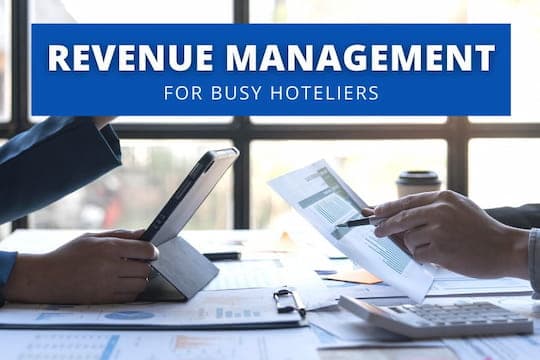Revenue Management Basics for Busy Hoteliers

Effective revenue management is a cornerstone for success in the bustling hotel industry. Busy hoteliers, constantly navigating the challenges of running a hotel, must embrace revenue management principles to ensure profitability and sustainability. This comprehensive guide demystifies revenue management basics, offering an accessible and practical approach for hotel owners and general managers.
Decoding Key Performance Indicators

Success in hotel revenue management mainly depends on understanding and effectively using key performance indicators (KPIs). Metrics such as occupancy rate, Average Daily Rate (ADR), Revenue per Occupied Room (RevPOR), Revenue per Available Room (RevPAR), Total Revenue per Available Room (TRevPAR), and Gross Operating Profit per Available Room (GOPPAR) provide a multifaceted view of your hotel's performance. Each of these metrics offers unique insights into different aspects of your hotel's revenue and can guide strategic decisions.
Mastering Forecasting and Demand Management
Effective revenue management is impossible without accurate forecasting and demand management. By analyzing historical data and market trends, hoteliers can predict future demand for rooms and services. This process involves techniques such as time series analysis, regression analysis, and market research, which are essential in understanding consumer behavior and competition, thus enabling informed pricing decisions.
Dynamic Pricing: A Game Changer
Adopting flexible pricing strategies is crucial in the dynamic and competitive hotel industry. Dynamic pricing involves adjusting room rates in real time based on current market data, considering supply and demand, competitor pricing, and seasonal variations. This approach ensures that pricing strategies are responsive and optimized for market conditions, maximizing occupancy and revenue.
The Power of Direct Bookings

Encouraging direct bookings is a vital strategy for maximizing revenue. Direct bookings reduce commission costs associated with third-party platforms and allow for direct engagement with guests, fostering loyalty and repeat business. Creating incentives for guests to book directly, such as offering exclusive discounts or rewards, is an effective way to increase direct bookings.
Leveraging Revenue Management Software
Revenue management software can greatly enhance efficiency and accuracy in today's technology-driven world. These tools, powered by AI and machine learning, analyze vast amounts of market data, providing insights and recommendations for optimal pricing. By automating many of the repetitive tasks associated with revenue management, these tools allow hoteliers to focus on strategic decision-making.
Exploring Ancillary Revenue Opportunities
Beyond room sales, there are numerous opportunities for generating ancillary revenue. Services such as spa packages, pet care, local tours, and even minibars can significantly increase per-guest revenue. Understanding your guests' preferences and offering relevant add-on services can enhance their experience while boosting your hotel's revenue.
Effective Online Presence and Reputation Management
A hotel's online presence and reputation in today's digital-centric world cannot be overstated. A robust search engine optimization (SEO) strategy is key to ensuring your hotel ranks highly in search results, thus drawing the attention of potential guests. Equally crucial is the management of online reviews. Positive reviews can significantly bolster your hotel's image, but the proactive and thoughtful handling of negative feedback truly showcases your commitment to guest satisfaction. This approach helps maintain a strong reputation and addresses some of the common hotel complaints and solutions, turning potential negatives into opportunities for improvement and customer loyalty.
Personalizing the Guest Experience

Personalization is a key factor in creating memorable guest experiences. Utilizing data from previous stays to anticipate guest preferences can significantly impact. Personal touches, such as customized amenities or tailored services, enhance guest satisfaction and encourage loyalty and repeat business.
Implementing Advanced Booking Strategies
Encouraging early bookings through discounts or special promotions is an effective way to secure revenue in advance. Advance booking strategies and understanding customer segments can greatly improve occupancy rates and revenue forecasting. Tailoring these strategies to cater to various guest segments, such as business travelers or families, ensures that the needs and preferences of all guests are met.
Upselling and Cross-Selling Techniques
Upselling and cross-selling are powerful tools in the arsenal of revenue management. Offering room upgrades or promoting complementary services during booking or check-in can significantly increase revenue. For instance, upselling to a suite or cross-selling spa treatments and dining experiences adds value to the guest's stay while enhancing the hotel's revenue.
Understanding the Role of Online Travel Agencies (OTAs)

While OTAs play a vital role in the distribution of hotel rooms, managing the relationship with these channels is crucial. Balancing direct bookings with OTA bookings requires a strategic approach. Offering exclusive deals or loyalty rewards for direct bookings can help shift the balance in favor of more profitable direct bookings while still leveraging the reach of OTAs.
Embracing Yield Management
YieldManagement is a strategy originally pioneered by the airline industry but has been effectively adapted to the hotel industry. It focuses on maximizing profit for specific assets at particular times, such as optimizing hotel room revenue during peak seasons. Understanding and implementing yield management strategies can significantly enhance your revenue management efforts, ensuring you are selling the right room to the right client at the right moment for maximum profit.
Market Demand Analysis and Pricing Adjustments
Analyzing market demand is crucial for effective revenue management. This involves studying historical data, guest spending habits, and booking trends to understand how demand fluctuates. Based on this analysis, adjusting your pricing and marketing strategies ensures that you effectively meet the market demand, optimizing occupancy and revenue.
Length of Stay Management
Managing the length of stay is a key strategy in revenue management. Encouraging longer stays through discounts or special packages can increase the overall revenue generated per guest. This approach also helps better resource allocation and reduces the turnover cost associated with short-stay guests.
Navigating Seasonal Variations
Understanding and adapting to seasonal variations in the hotel industry is vital. During peak seasons, you can capitalize on high demand by optimizing prices, while during off-peak periods, offering discounts or special promotions can help maintain steady occupancy levels and revenue.
Staff Training and Empowerment

Empowering your staff with knowledge and skills in revenue management can lead to more effective implementation of strategies. Training your team to understand the basics of revenue management, customer segmentation, and dynamic pricing can enhance their ability to contribute to the hotel's overall revenue goals.
Competitive Analysis and Benchmarking
Regularly analyzing your competitors' strategies and benchmarking your hotel against industry standards can provide valuable insights. Understanding what others in the industry are doing, their pricing strategies, and how they manage occupancy can help you fine-tune your approach and stay competitive.
Integrating Revenue Management Across Departments
Effective revenue management is not just the responsibility of the revenue manager or the sales team; it requires integration across all departments. Every team member, from the front desk to housekeeping, plays a role in implementing revenue management strategies and enhancing the overall guest experience.
Continuous Improvement and Adaptation
The hotel industry is constantly evolving, making it essential for hoteliers to improve and adapt their revenue management strategies continuously. Staying abreast of industry trends, adopting new technologies, and being open to experimenting with new approaches are key to long-term success.
Embracing Revenue Management Strategies for Hotel Success
Revenue management is a multifaceted discipline requiring a strategic approach and a deep understanding of various factors influencing hotel profitability. For hoteliers who find it challenging to consistently apply these principles due to the demands of their role, seeking professional assistance can be a game-changer. Bridgetown Revenue Management Solutions offers expert guidance and support to help you navigate the complexities of revenue management. We invite you to explore our services and enjoy a complimentary consultation. Enhance your hotel's profitability with our RMS revenue solutions.


